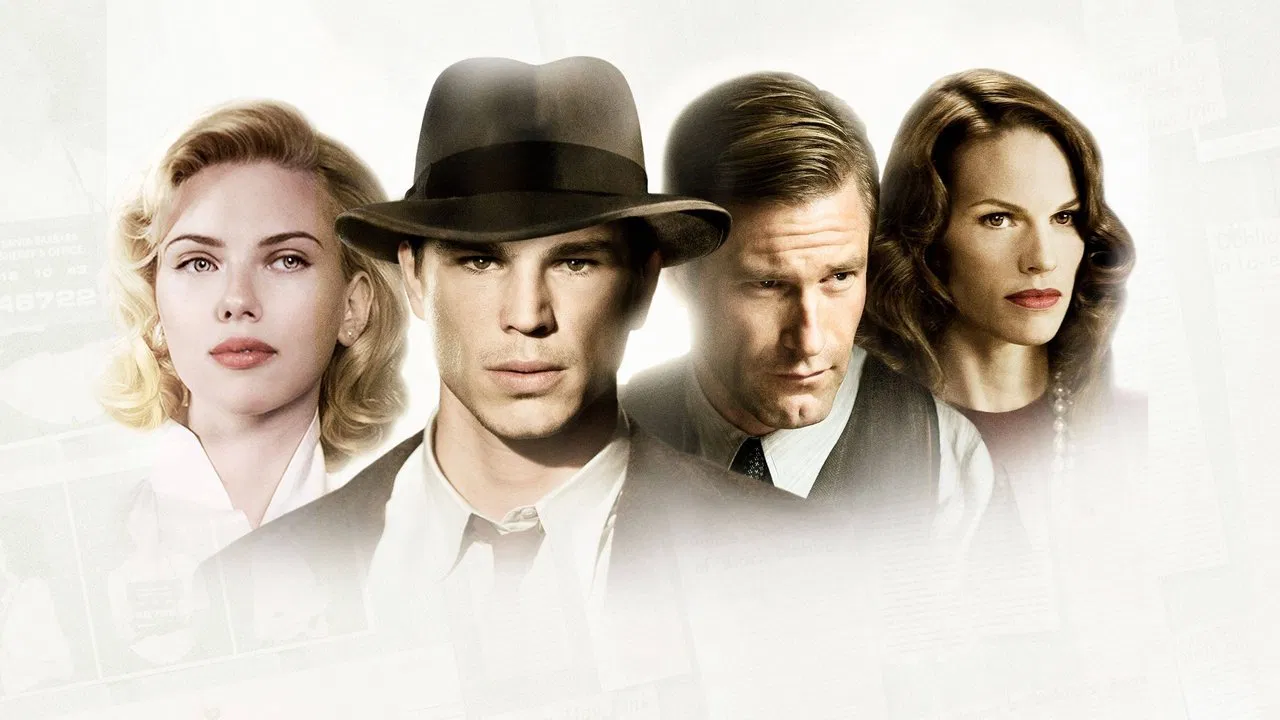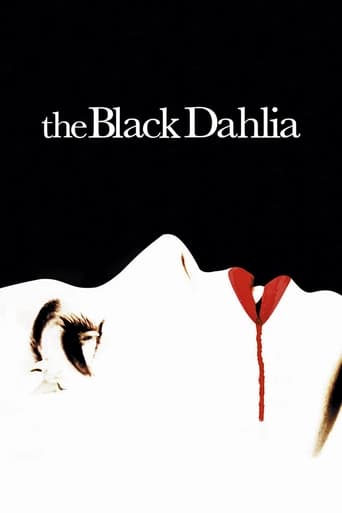

This is a fictional account of the investigation into the infamous case of the Black Dahlia, the murder of Hollywood wanna-be Elizabeth Short (Mia Kirshner). The film opens introducing two police officers and former boxers Lee Blanchard (Aaron Eckhart) and Dwight 'Bucky' Bleichert (Josh Hartnett). Lee lives with the flirty and high maintenance Kay Lake (Scarlett Johansson) well beyond his means unquestioned by his partner. They are assigned the case of Raymond "Junior" Nash, child rapist and murderer. When the Black Dahlia case comes up and becomes more high profile, Lee insists on taking it over and abandoning the Nash case...he is described as a "political animal." The investigation leads to the seedy underground of Hollywood films. This is where Bucky meets Hilary Swank who looks similar to the dead girl.The film felt slow. The "B" dialogue had no zip as the actors gave us what could be borderline raspberry performances. There is a mystery aspect that is explained in the last few minutes.This film was nominated for an Oscar "Best Achievement in Cinematography" and The Stinkers Bad Movie Awards in four categories.Guide: F-word and nudity.
... View More1940s Los Angeles. Two cops, Bucky Bleichert and his partner, Lee Blanchard, investigate the death of a young woman found brutally murdered. Bucky soon realises that his current girlfriend had ties to the deceased, and soon after that, he begins uncovering corruption and conspiracy within the police department........Every director has a bad film in their repertoire, that one mistake that ever so slightly tarnishes an illustrious career. Spielberg has 1941, Scorcese has Gangs Of New York, and Michael Bay has his CV.This is De Palmas misstep. But what a misstep it is. Usually with his movies, you have the wonderful cinematography that adds that depth that is synonymous with his movies, and it's here in all its glory, but it's overused, as if he's trying to cover the fact that the whole film is an incoherent mess.So we have two hours and one minute of Josh Hartnett walking around, looking confused, and being either mocked, threatened, punched, made to look a fool, and discovering so etching just as it's too late. And he looks as confused as the audience. The story of The Black Dahlia is a fascinating insight to Hollywoods seedier side, but it's dealt here with a fist fully loaded with ham, and alongside Hartnett, the cast are simply putting in over camp pantomime performances.Johanssen, when she's not looking at Hartnett from the top of the stairs, is just mind numbing as a wannabe Femme Fatale, woefully miscast in her role.Swank makes an extended cameo and spends the majority of it in bed, but she has a secret that is pivotal to the narrative AKA she helps to end it.Eckhart phones in his performance, mugging aimlessly throughout, and just adding to the whole mess.It's nothing more than a best of De Palma cinematography compilation, featuring a miscast, usually better people, a pantomime villain, and it will leave you with a headache and a tinge of anger, because you know the director is so much better than this.
... View MoreA box office failure and a neo-noir film that confounded critics and fans alike, The Black Dahlia now appears to be a pic that has had its strengths ignored. As the clamour to kick Brian De Palma continues unabated to this day, and the point blank refusal to accept that Josh Hartnett is a better actor than the likes of Pearl Harbor suggests, it's a film worthy of a revisit by genre/style fans alike. Plot revolves around the infamous murder of one Elizabeth Short in Hollywood, 1947. An aspiring actress who was found butchered and her murder to this day remains unsolved. De Palma and his writer Josh Friedman adapt from noir legend James Ellroy's novel of the same name, the crux of the story is about two hot-to-trot detectives who get involved in the Short case, and pretty soon there is a can of worms that has been shaken and opened, and there's dizzying worms everywhere - we think? De Palma loves noir, he has dabbled with it for a long time, not all of it works, but often he delivers for like minded cinephiles. With expectation levels high and following in the slipstream of the critical darling that was L.A. Confidential, Black Dahlia never really had a hope of achieving its lofty ambitions, yet it's a tremendously realised picture from a noir stand point. Whilst it showcases the technical wizardry of the director. The charges of it being convoluted are fair, it's a spinning narrative, stories within stories, characterisations obtuse, but so was The Big Sleep! I know, I know, this is not fit to lace the boots of Hawks' genius movie, but tricksy narratives have always been a fundamental part of many a film noir, so why the distaste for this one? Especially since the period design, costuming, styling, photography and characterisations are so rich in detail? For instance Hartnett's detective is gumshoe nirvana, while Scarlett Johansson and Hilary Swank fatale the femme with mischievous glee. But of course De Palma then spells it out for the finale, explaining things, a sort of macabre wrap up for those that needed it. Either way he was never going to win, it's too complex, it didn't need spelling out, while Mr. De Palma we have to tell you that your characters have been too cold, we don't feel them?! Huh? This is noirville, a place frequented by bad people, idiots and hapless dreamers, of dupes and double crossers. Hell there's even a suggestion of necrophiliac tendencies in this, and that's before we even delve into the machinations of the two femme fatales, a family that's lacking Adams Family Values and coppers of dubious motives. Yeah, it's cold, and yes De Palma is guilty of trying to please all parties by covering all bases, but it's far from being a stinker. Haters of De Palma, Hartnett and complex noir narratives can knock two points off of my own personal rating, otherwise it's 7/10.
... View MoreNo. It wasn't just the presence of that little "dimple-chin", Aaron Eckhart, who ultimately ruined this utterly pretentious "Cop" movie for me. But Eckhart sure played a major part in bringing The Black Dahlia (TBD, for short) down to its sub-par level, but fast.TBD was the sort of below-average picture that quickly encouraged this viewer to keep his remote firmly in hand with index-finger waiting impatiently to press the fast-forward button at a split-second's notice.Here's a movie whose 2-hour running time could have easily been edited down to 90 minutes. And it's also a movie which proved that director Brian De Palma is clearly no longer a master of his craft as a film-maker (as he was once considered to be by many film buffs).As well - TBD was an atrociously dull and totally inaccurate re-telling of a true murder case that had shocked the public silly and sent the LAPD on a wild-goose chase back in 1947.Regardless of its $50 million budget and its meticulous attention to period detail, TBD was far from coming close to being a first-rate production on any level.And when it eventually came down to this film's final revelations (concerning the true identity of Elizabeth Short's murderer), it was such a stupid, laughable joke, that it wasn't even worth the 110-minute wait at all.
... View More